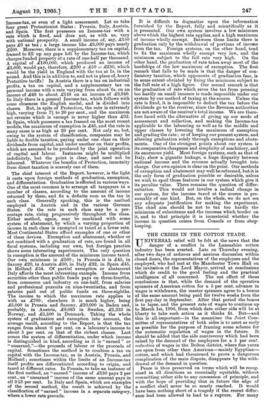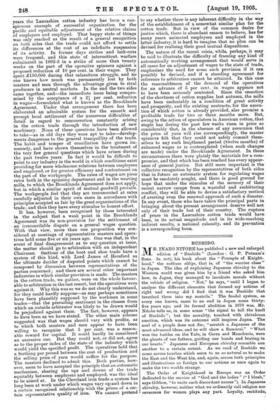-U NIVERSAL relief will be felt at the news that the
danger of a conflict in the Lancashire cotton industry has been averted. Late on Thursday evening, after two days of arduous and anxious discussion within closed doors, the representatives of the employers and the employed, who had met at the Manchester Town Hall on the invitation of the Lord Mayor, arrived at conclusions which do credit to the good feeling and the practical intelligence of all concerned. The net effect of these conclusions is that, while the demand of the operative spinners of American cotton for a 5 per cent. advance in wages is withdrawn, the master spinners agree to a bonus of the same amount being paid for twelve weeks from the first pay-day in September. After that period the bonus is to lapse, and the present rate of wages to continue up to March 1st, 1906, from which date either side will be at liberty to take such action as it thinks fit. But—and this is all-important--in the meantime the Joint Com- mittee of representatives of both sides is to meet as early as possible for the purpose of framing some scheme for the automatic regulation of wages in the future. It should be added that the side controversy which had been raised by the demand of the employers for a 5 per cent. reduction of wages in the Bolton district, where fine yarns are spun from other than American—mainly Egyptian—; cotton, and which had threatened to prove a dangerous complication of the main dispute, disappears by the with- drawal of the demand in question.
Peace is thus preserved on terms which will be recog- nised in all directions as essentially equitable, without committing either side to any concession of principle, and with the hope of providing that in future the edge of a conflict shall never be so nearly reached. It would have been nothing short of a tragedy if the recent differ- ence had been allowed to lead to a rupture. For many years the Lancashire cotton industry has been a con- spicuous example of successful organisation for the pacific and equitable adjustment of the relative claims of employers and employed. That happy state of things was only reached as the result of a general recognition on both sides that the trade could not afford to settle its differences at the cost of an indefinite suspension of its activity. In former days strikes and lock-outs wore frequent, and this state of intermittent, warfare culminated in 1892-3 in a strike of more than twenty weeks on the part of the operative spinners against a proposed reduction of 10 per cent. in their wages. They spent £150,000 during that calamitous struggle, and no one knows how much was permanently lost by both masters and men through the advantage given to rival producers in neutral markets. In the end the two sides came together, and—the immediate issue being compro- mised by the acceptance of a 2t per cent. reduction in wages—formulated what is known as the Brooklands Agreement. Under that arrangement there has been elaborated an admirable system for the smooth and prompt local settlement of the numerous difficulties of detail in regard to remuneration constantly arising in the cotton trade through the introduction of new machinery. None of these questions have been allowed to take—as in old days they were apt to take—develop- ments dangerous to the general tranquillity of the trade. The habit and temper of conciliation have grown im- mensely, and have shown themselves in the treatment of the very few general questions which have arisen during the past twelve years. In fact it would be difficult to point to any industry in the world in which conditions exist providing for more wholesome relations between employers and employed, or for greater efficiency and contentment on the part of the workpeople. The rates of wages are piece rates both in the spinning department and in the weaving mills, to which the Brookla.nds Agreement does not apply, but in which a similar spirit of mutual goodwill prevails. The workpeople feel that they are remunerated at rates carefully adjusted in their own cases in accordance with principles accepted as fair by the great organisations of the trade; and thus they have every stimulus to honest effort. It has, however, been recognised by those interested in the subject that a weak point in the Brooklands Agreement was its non-provision for the settlement of an irreconcilable dispute on a general wages question. With that view, more than one proposition was con- sidered at meetings of representative masters and opera- tives held some five or six years ago. One was that, in the event of final disagreement as to any question at issue, the matter should go to arbitration with an independent Chairman. Sections of the boot and shoe trade have a system of this kind, with Lord James of Hereford as the ultimate decider of disputed points which cannot be composed by discussion between representatives of the parties concerned ; and there are several other important industries in which similar provision is made. The masters in the cotton trade, we gather, were on the whole favour- able to arbitration in the last resort, but the operatives were against it. Why this was so we do not clearly understand, for they could hardly suppose—as may perhaps sometimes have been plausibly supposed by the workmen in some trades—that the prevailing sentiment in the classes from which an outside arbitrator was likely to be drawn would be prejudiced against them. The fact, however, appears to have been as we have stated. The other main scheme suggested was that wages should vary with profits, as to which both masters and men appear to have been willing to recognise that 5 per cent. was a reason- able reward for capital. It could hardly be considered an excessive one. But they could not, or did not, agree as to the proper index of the state of the industry which would yield the specified profit. The operatives held that a farthing per pound between the cost of production and the selling price of yarn would suffice for the purpose. The masters declined to admit this. Both parties, how- ever, seem to have accepted the principle that an automatic mechanism, sharing the ups and downs of the trade equitably between employers and employed, was the ideal to be aimed at. In the Cleveland iron trade a system has long been at work under which wages vary up and. down in a certain recognised relationship with the prices of a cer- tain representative quality of iron. We cannot pretend to say whether there is any inherent difficulty in the way of the establishment of a somewhat similar plan for the cotton trade. But in view of the common desire for justice which, there is abundant reason to believe, has for many years animated employers and employed in the latter industry, it is hard, to imagine that no plan can be devised for realising their good mutual dispositions.
The nature of the recent crisis, while, perhaps, it may be said to illustrate the difficulty of framing any kind of automatically working arrangement that would serve in all cases for an adjustment of wages to the state of trade, emphasises the need for some such provision if it can possibly be devised, and if a standing agreement for reference to arbitration cannot be attained. In this case the reasonableness of the demand of the operatives for an advance of 5 per cent. in wages appears not to have been seriously contested. Since the cessation of the shortness of cotton supplies last autumn, the mills have been undeniably in a condition of great activity and prosperity, and the existing contracts, for the execu- tion of which cotton is already provided, also promise a profitable trade for two or three months more. But, owing to the action of speculators in American cotton, that staple has during the past few weeks risen in price so considerably that, in the absence of any assurance that the price of yarn will rise correspondingly, the master spinners felt that they could not safely commit them- selves to any such lengthened period (twelve months) of enhanced wages as is contemplated (when such changes are made) under the Brooklands Agreement. In these circumstances there were plainly the materials for a com- promise, and that which has been reached has every appear- ance of general justice. But still more important is the collective recognition by the representatives of both sides that in future an automatic system for regulating wages must be resolutely sought, and there is good ground for hope that under the stimulus of the memory of their recent narrow escape from a wasteful and embittering conflict, they will be able to devise a satisfactory method of averting even the renewed approach of such a disaster. In any event, those who have taken'the principal parts in bringing about the present arrangement deserve well not only of their trade but of their country. The rupture of peace in the Lancashire cotton trade would have been, in its actual magnitude and. in its wide-reaching indirect results, a national calamity, and its prevention is a corresponding boon.



































 Previous page
Previous page